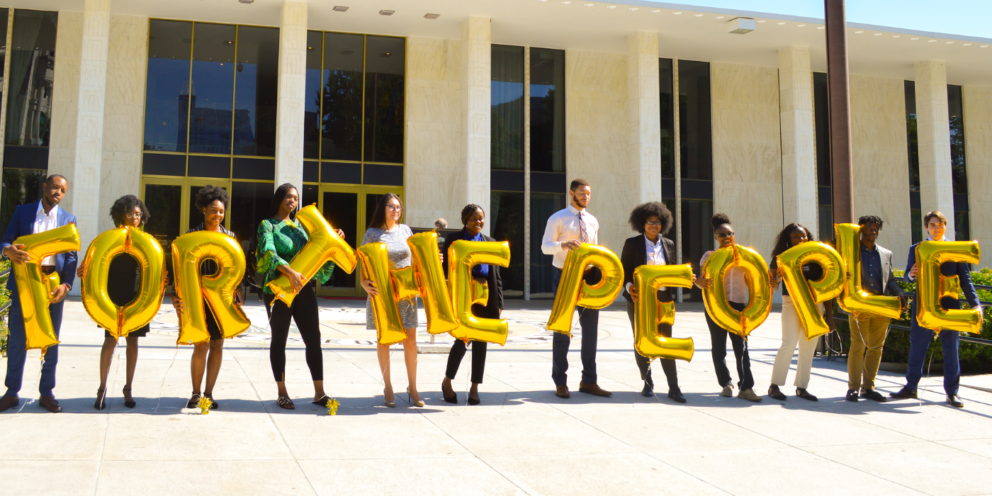
Democracy Summer interns get real-world experience in organizing, communications, and advocacy. Students have helped win back the last Saturday of Early Voting; prepared voters for the General Elections; beat back anti-voter and racist bills; launched the Democracy NC TikTok channel; and spoke out and lobbied against bills that directly impact student voters.
Apply to be a 2026 Democracy Summer Friendtern!
Students work in our Organizing department to gain valuable skills and experience while fighting for a democracy that works for all.OVERVIEW
We transform outstanding students into frontline advocates for democracy. Now in its 27th year, Democracy Summer is an innovative internship program that exposes young leaders to new ideas and political movements. We teach our “friendterns” how to organize people around a shared vision for a better democracy in our state, address structural barriers to civic engagement, and build power alongside historically marginalized groups. This program equips young people with lifelong skills that they can use to work for positive social change in their communities.
Democracy Summer introduces Organizing Friendterns to the culture and practices that make grassroots organizing the soul of the movement. Friendterns will: Recruit local volunteers to partake in mobilization efforts; advocate for local and state policies; develop lasting relationships with advocates and coalition members; and create communication and marketing approaches for increasing turnout. The organizing interns will be working in one of five regions: Charlotte/Western Piedmont, Fayetteville/Southeast, Greenville/East, Raleigh/Greater Triangle, Winston-Salem/Greensboro/Central Piedmont.
REQUIREMENTS
- Applications are due by Friday, March 13, 2026.
- Student interns work up to 40 hours per week (including some evenings and weekends) from early June to late July for a total of 9 weeks and earn a stipend of $5,000 (taxable) for the summer.
- Applicants must be a rising sophomore, junior, senior, or graduating senior, enrolled in a North Carolina community college, college, or university. Applicants must live in North Carolina for the 2026 summer.
- This is a full-time job, so students taking summer classes or who have other part-time work cannot realistically participate in the program.
- Students are expected to live in/near one of our five regions: Charlotte/Western Piedmont, Fayetteville/Southeast, Greenville/East, Raleigh/Greater Triangle, and Winston-Salem/Greensboro/Central Piedmont.

"I want to thank Democracy NC because I see how much I've grown as a leader and an organizer, & I'm proud of myself for stepping out from behind the scenes to fight for what's right."
- Khalil J. Cobb, University of North Carolina at Greensboro
Democracy Summer starts with a required training orientation, then interns work in their respective departments fighting for social change. They interact with civic leaders, veteran activists, elected officials, the news media, and of course each other and Democracy NC staff. Interns gain an insider’s view of the political climate, legislative process, and power structure in North Carolina.
Who Can Apply
Students must be able to participate in the entire summer program to be eligible. Democracy Summer is ideal for students interested in a career in public service, politics, a non-profit field, or community-based work. Because student interns are responsible for covering their own housing, most participants apply to work in cities where they have family or other living arrangements available. Other requirements:
- You must live in North Carolina for the summer.
- As of the summer, you must be a rising sophomore, junior, senior, or graduating senior enrolled in a North Carolina community college, college, or university.
- This is a full-time job, so students taking summer classes or who have other part-time work cannot realistically participate in the program.
The ideal applicant will have:
- A passion for racial, social, and economic justice
- An ability to communicate with diverse groups of people
- An interest in and a general understanding of local and/or state level politics
- An ability to work independently and as part of a team
RELATED
“When I moved to America from Mexico, I wanted to empower the Latinx community, who feel like their voices aren't important. It is my turn to make my new home just, diverse, and of equal opportunity to everyone. Democracy NC gave me the skills to get started.” –Veronica Fonseca, University of North Carolina at Chapel Hill